Finding the perfect substitute for pomegranate isn’t as tricky as you might think.
We’ve got the scoop on the top five swaps that’ll save your dish in a pinch.
Guess what? You probably have some of these alternatives in your kitchen right now.
Cranberries pop up as an awesome swap, bringing a similar tartness and color to the table.
Ever thought about using cherry juice? It’s a sweet move for both drinks and dressings.
And if you’re in a real bind, a mix of berries can mimic that pomegranate vibe.
No need to cancel your cooking plans if pomegranate’s missing.
These subs are here to keep your culinary creations on track.
And hey, you might just discover a new favorite flavor combo along the way.
What is Pomegranate?

Pomegranate is the name given to fruit and the tree that bears it.
The pomegranate tree is native to tropical and subtropical regions worldwide and cultivated since ancient times.
The fruit is round or oval and has tough, leathery skin.
Inside the fruit are hundreds of small seeds, each surrounded by juicy, red, or pink flesh.
In terms of taste, pomegranates are tart and tangy, with a sweetness that can vary depending on the variety.
The seeds also have a crunchy texture, making them enjoyable to eat.
In recent years, pomegranates have become more popular in other parts of the world as people have become more aware of their health benefits.
Pomegranates are a good source of vitamins C and K, fiber, and antioxidants.
They have been linked to various health benefits, including better heart health, stronger bones, and improved brain function.
Pomegranate seeds are often used in salads, desserts, and other dishes.
The fruit juice can also make wine, vinegar, and syrup.
In addition to being eaten fresh, pomegranates are also used in traditional medicines and cosmetics.
The 5 Best Substitutes for Pomegranate
Pomegranate, with its juicy arils and tangy-sweet flavor, is a popular fruit known for its vibrant color and health benefits.
However, if you’re looking for alternatives or need a substitute due to availability or personal preference, there are several options to explore.
In this guide, we will compare the top 5 substitutes for pomegranate, discussing their key characteristics and suggesting proper ratios to help you find suitable alternatives.
| Substitute | Key Characteristics | Proper Ratio |
|---|---|---|
| Cranberries | Tart and slightly sweet flavor; firm texture; rich in antioxidants | Use an equal amount of cranberries as a substitute for pomegranate arils |
| Raspberries | Sweet and slightly tart flavor; soft texture; delicate and vibrant color | Use an equal amount of raspberries as a substitute for pomegranate arils |
| Blackberries | Sweet and slightly tart flavor; juicy texture; deep purple-black color | Use an equal amount of blackberries as a substitute for pomegranate arils |
| Dried Barberries | Tart and tangy flavor; chewy texture; commonly used in Middle Eastern cuisine | Use an equal amount of dried barberries as a substitute for pomegranate arils |
| Red Currants | Tangy and slightly sweet flavor; small and firm texture; bright red color | Use an equal amount of red currants as a substitute for pomegranate arils |
Now, let’s dive into each substitute in more detail:
1. Cranberries
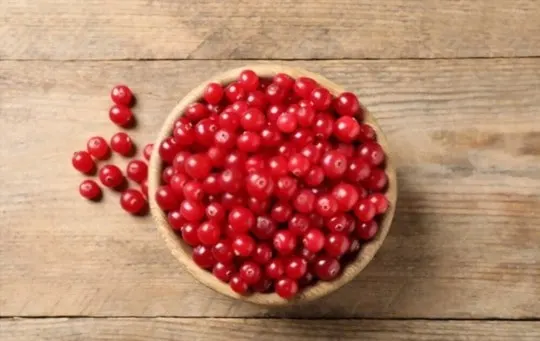
Cranberries are a small, tart fruit often used in holiday dishes.
Cranberries are native to North America, and they have been cultivated for centuries by the region’s indigenous people.
The Pilgrims also brought cranberries when they settled in the New World.
Cranberries are an important crop in many parts of the United States, and they are also grown commercially in other countries, such as Chile and Argentina.
Cranberries are a versatile fruit, and they can be used in a wide variety of recipes, from sauces and pies to jams and juices.
Cranberries are also a good source of Vitamin C, and they have been shown to have numerous health benefits.
In recent years, cranberries have become popular as a superfood, and they are often touted for their ability to prevent urinary tract infections and improve heart health.
While cranberries are not an exact replacement for pomegranates, they can be used in many of the same dishes.
Cranberries have a similar tartness to pomegranates, and they can be used as a garnish or added to a fruit salad.
Cranberries can also be used to make the sauce, and they make a great addition to holiday recipes.
- Key Characteristics: Cranberries have a tart and slightly sweet flavor with a firm texture. They are rich in antioxidants, making them a healthy substitute for pomegranate arils.
- Proper Ratio: Use an equal amount of cranberries as a substitute for pomegranate arils. Adjust the sweetness level based on personal preference by adding a touch of honey or sugar if desired.
2. Raspberries
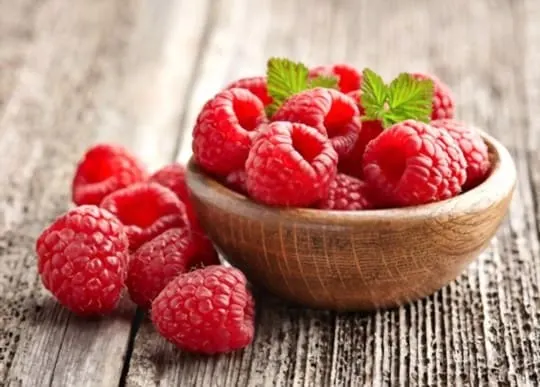
Raspberries are a type of fruit that most people know and love.
They are small, red, and have a distinctively sweet taste.
Many people don’t know about raspberries because they are a member of the rose family.
The raspberry plant is similar to a rose bush, with thorny stems and large leaves.
Raspberries are native to Europe and Asia, but they can now be found worldwide.
They are usually harvested in the summertime, but some varieties can be found year-round.
Raspberries are a versatile fruit used in pies, jams, and even wine.
There are a few things to keep in mind when it comes to substituting pomegranate for raspberries.
First, raspberries are much smaller than pomegranates, so you need to use more of them to get the same effect.
Second, raspberries are not as tart as pomegranates, so you may want to add a little lemon juice or vinegar to balance out the sweetness.
Finally, raspberries are very delicate and can easily be crushed, so handle them carefully.
- Key Characteristics: Raspberries offer a sweet and slightly tart flavor with a soft texture. Their delicate and vibrant color can provide a visually pleasing substitution for pomegranate arils.
- Proper Ratio: Use an equal amount of raspberries as a substitute for pomegranate arils. Consider adjusting the sweetness level by adding a bit of lemon juice or honey, if desired.
3. Blackberries
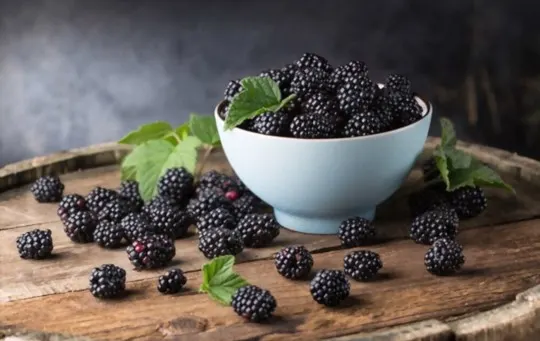
Blackberries are a type of fruit often eaten raw, used in pies or jams, or made into wine.
The blackberry plant is a member of the rose family, and its fruits are classified as aggregate fruits, which means that each berry is composed of many smaller drupelets.
Blackberries are native to Europe, Asia, and Africa, but they can now be found worldwide.
In some regions, blackberries are considered to be an invasive species.
Blackberries are a good source of vitamins A and C, dietary fiber, and antioxidants.
They have also been shown to have anti-inflammatory properties.
Blackberries can be enjoyed fresh or cooked, and they make a delicious addition to any number of dishes.
When it comes to choosing a substitute for pomegranate, blackberries are a great option.
Blackberries have a similar tart and tangy flavor to pomegranate, making them a perfect stand-in for this fruit in any recipe.
Additionally, blackberries can be used in sweet and savory dishes, making them even more versatile.
Just keep an eye on your portion size, as blackberries are high in sugar.
- Key Characteristics: Blackberries have a sweet and slightly tart flavor with a juicy texture. Their deep purple-black color adds visual appeal to dishes as a substitute for pomegranate arils.
- Proper Ratio: Use an equal amount of blackberries as a substitute for pomegranate arils. Adjust the sweetness level based on personal preference by adding a touch of honey or sugar if desired.
4. Dried Barberries

Dried barberries are the perfect addition to your pantry.
Not only do they add a pop of color to your dishes, but their tart flavor is a great way to liven up any recipe.
And because they’re so easy to store, you can always have them on hand for when the mood strikes.
Hydrate in water for about 15 minutes and then add them to your dish.
They’ll add a lovely touch of sweetness and acidity to make your meal sing.
Compared to other dried fruits, barberries have a relatively short shelf life.
But if you store them properly in an airtight container, they can last up to a year.
Just check on them periodically to make sure they’re not getting too wrinkled.
When they lose their plumpness, it’s time to toss them out.
When substituting for pomegranate, use a similar amount of dried barberries.
You may need to adjust the cooking time slightly, but overall, they should work well in most recipes.
- Key Characteristics: Dried barberries offer a tart and tangy flavor with a chewy texture. They are commonly used in Middle Eastern cuisine and can provide a unique substitute for pomegranate arils.
- Proper Ratio: Use an equal amount of dried barberries as a substitute for pomegranate arils. Soak the dried barberries in hot water for a few minutes before using to soften them.
5. Red Currants
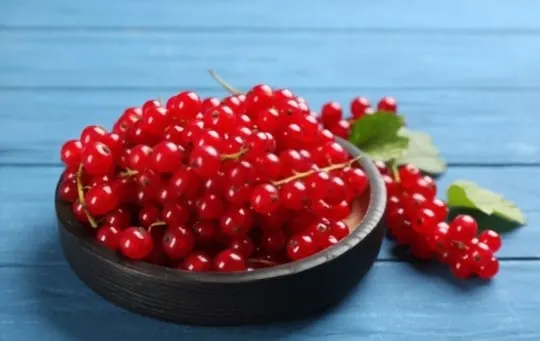
If you’re looking for a delicious summer fruit that’s also good for you, look no further than the red currant.
This ruby-red berry is a tasty treat, but it’s also packed with vitamins and antioxidants.
Redcurrants are an excellent source of Vitamin C, providing over 40% of your daily needs in just one cup.
They also contain dietary fiber, potassium, and magnesium.
What’s more, redcurrants are low in calories and have a very low glycemic index, making them a great choice for those watching their weight.
When it comes to flavor, both currants and pomegranate have a similar taste and can be used in many dishes.
In addition, they are usually less expensive than pomegranates and are easier to eat since they do not have seeds.
However, there are a few things to consider when substituting red currants for pomegranates.
First, redcurrants are much smaller than pomegranates and will not provide the same visual impact in dishes.
Second, they have a slightly sour flavor that may not be to everyone’s liking.
- Key Characteristics: Red currants have a tangy and slightly sweet flavor with small and firm texture. Their bright red color adds visual appeal as a substitute for pomegranate arils.
- Proper Ratio: Use an equal amount of red currants as a substitute for pomegranate arils. Adjust the sweetness level by adding a touch of honey or sugar if desired.
Conclusion
Pomegranate is a fruit that is popular for its nutritional value and flavor.
It is high in antioxidants and vitamins and linked to various health benefits.
However, pomegranate can be difficult to find in stores, which can be pricey.
As a result, many people look for substitutes.
While many options are available, not all of them are created equal.
Some substitutes lack the nutritional value of pomegranate, while others don’t taste as good.
When choosing a substitute, it is important to consider your goals.
If you are looking for a fruit with a similar flavor, cranberries or raspberries might be better.
No matter your goal, there is sure to be a pomegranate substitute that meets your needs.
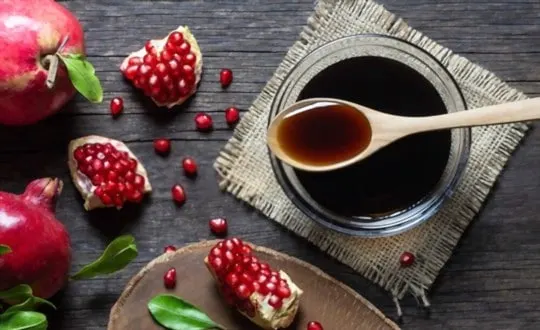
The 5 Best Substitutes for Pomegranate
Ingredients
- Cranberries
- Raspberries
- Blackberries
- Dried Barberries
- Red Currants
Instructions
- Pick your favorite substitute from the list above.
- Follow cooking directions for your selected substitute with the proper ratio of ingredients.

Andrew Gray is a seasoned food writer and blogger with a wealth of experience in the restaurant and catering industries. With a passion for all things delicious, Andrew has honed his culinary expertise through his work as a personal chef and caterer.
His love for food led him to venture into food writing, where he has contributed to various online publications, sharing his knowledge and insights on the culinary world. As the proud owner of AmericasRestaurant.com, Andrew covers a wide range of topics, including recipes, restaurant reviews, product recommendations, and culinary tips.
Through his website, he aims to inspire and educate fellow food enthusiasts, offering a comprehensive resource for all things food-related.

Leave a comment